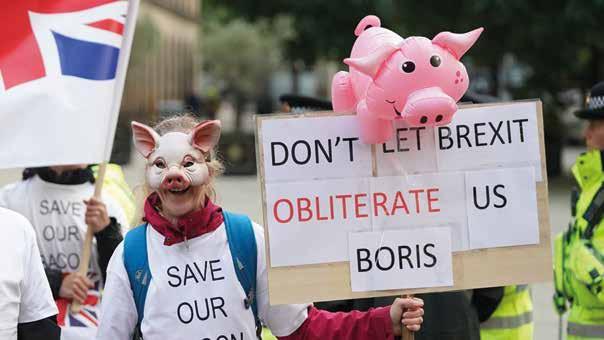
4 minute read
A CRISIS NOT OF OUR MAKING
Brian Chester reports
As this 2022 edition of the Pig Guide went to the printer the British pig industry continued to face many challenges. Sustained protests to an apparently uninterested government – while the build up of market-ready pigs on the farm increased with producers in despair as they began to cull top quality, healthy stock and see the carcasses go to waste – finally produced the go-ahead for temporary visas to allow processors to employ foreign nationals to tackle the backlog on UK farms.
This belated action, however, cannot wipe away the previous apparent lack of interest and dismissive attitude by those in Government who the industry had looked to for help. It took persistent lobbying by the industry, face-to-face protests and wide media coverage, to make an impact.
Up to that point it was as if production of pig meat in this country could be put aside and with the industry left to suffer the consequences of a disaster that was not of its making. Pig meat is easy enough to import from a dozen or more countries – while conveniently ignoring the ‘promises’ (and real consumer concern) on animal welfare and aided by the fact that proposed import checks on meat have been put back to July 2022. And whoever mentioned food security? Does the ‘lesson to be learned’ of over reliance on third-party suppliers which still flickers in the flames of the gas crisis, mean nothing?
For those who like to speculate on these things there could be a message here for other sectors of the UK food chain should misfortune strike.
It is against this background – unprecedented since the Pig Guide was first published 26 years ago – that the 2022 edition was prepared. We are grateful to the organisations and companies which have contributed to the Guide allowing it – and its companion website www.pig-guide.com – to continue as a principal reference source during the coming year and thereafter.
The effectiveness of the Government concession to allow processors to ‘import’ butchers will depend on how quickly they arrive. But the sad truth is that, whatever the outcome, it will not be a quick fix. All sectors of the industry covered in these pages will be called on to work together to ease the pain and repair the damage.
This issue also contains reference to those organisations dedicated to providing help in times of crisis and need (see opposite). These contacts will be listed on the website and kept up-to-date.
But questions remain: why it needed a campaign by the industry to bring those in government to their senses. This crisis did not happen over night. And what happens when the six-month permits run out given processors say they need at least 8,000 more butchers? Another backlog? Another crisis?
Where there is help....
When faced with challenges, it’s reassuring to know that there are a number of resources you can access. Their practical advice, guidance and support continue to make a huge difference to many in the farming community.
The Farming Community Network
The FCN is a primary source for pastoral and practical support for anyone in the farming community, with a particular focus on farmers and farming families. The helpline is available every day of the year, 7am to 11pm.
www.fcn.org.uk Helpline: 03000111999
The YANA Project
The YANA Project provides confidential support, mental health awareness and funding for counselling for those in farming and rural trades in Norfolk, Suffolk and Worcestershire. It has published and funded a directory of regional support groups and key national charities which can specifically help those in the rural communities.
www.yanahelp.org Helpline: 0300 323 0400
The DPJ Foundation
The DPJ Foundation was set up in July 2016 in Pembrokeshire, supporting those in the agricultural sector. The mental health charity has grown and covers the whole of Wales with all areas of support. The DPJ Foundation works with leading organisations in the sector including NFU Cymru, FUW, YFC, vets and Welsh Government to help provide an accessible and flexible service.
www.thedpjfoundation.co.uk Helpline: 0800 587 4262
Mind – the mental health charity
Mind provides advice and support to anyone experiencing a mental health problem. The charity campaigns to improve services, raise awareness and promote understanding.
www.mind.org.uk Infoline: 0300 123 3393
The Royal Agricultural Benevolent Institution
RABI offers financial support to farming people of all ages facing hardship. Every application for support is treated on its own merit, working with compassion and discretion. Support is offered on both a short-term and long-term basis, with many becoming ‘full beneficiaries’ of the charity, receiving on-going payments.
www.rabi.org.uk Helpline: 0800 188 4444
The RSABI
RSABI offers practical and financial support and friendship to more than 600 individuals and their families working on the land in Scotland. The team works to support anyone who asks for help and is within their scope, in the strictest confidence.
www.rsabi.org.uk Helpline: 7am -11pm: 0300 111 4166
The Addington Fund
The Addington Fund provides homes for farming families in England and Wales who have to leave the industry through no fault of their own. Hardship grants are also available, at the trustees’ discretion, in times of emergency.








